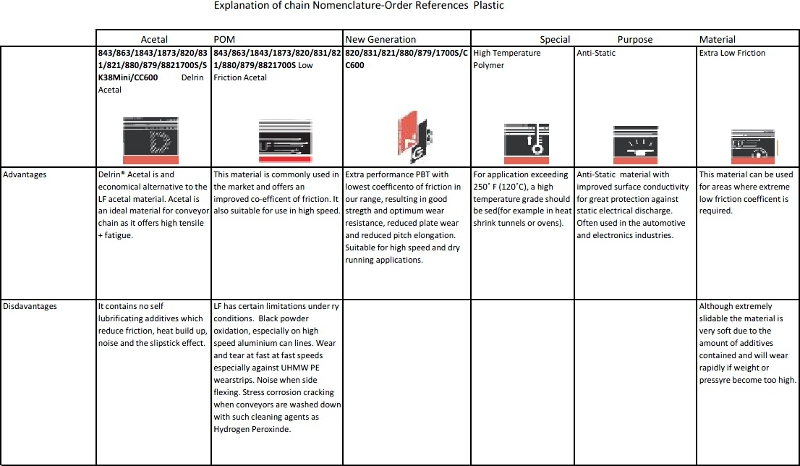| | | Material Used for Plastic Chain ProductionFlat Top Chains | Plastic Flat Top | Material Used for Plastic Chain Production 1. Acetal Plastic (POM)Acetal is an engineering Polymer with an outstanding range of mechanical properties.
These are:
• High strength and stiffness.
• Anhydrous (will not absorb water).
• Excellent fatigue resistance.
• Excellent sliding properties.
• Exhibits low friction coefficients.
• Extreme temperature ranges from
40° to +180° F (–40 to 80° C).
Acetal chains are available in two
basic grades:
1.1 Delrin® Acetal
This is the original basic compound introduced in the 1950s and contains no self lubricating additives which reduce friction, heat build up, noise and the slipstick effect. For these reasons D Acetal is now rarely used as a side-flexing material.
1.2 Low Friction Acetal
This material was developed in the 1970s and contains a small percentage of PTFE which reduces its friction coefficient substantially. “LF” has since become the industry standard for plastic conveyor chains and is the ideal choice for most applications. However, as industrial demands become ever tougher LF has certain limitations under dry conditions:
• Black powder oxidation, especially on high speed aluminum can lines.
• Wear and tear at fast speeds, especially against UHMW PE wearstrips.
• Noise when side-flexing.
• Stress corrosion cracking when conveyors are washed down with such cleaning agents as Hydrogen Peroxide.
These factors have been predominant in the development of our latest material, created for the demands of the next century: New Generation.
|  | 2. New GenerationExclusively developed in conjunction with DuPont, this material looks to the future requirements of conveying chains: higher speeds, reduced lubrication,
less wear, less tear.
The benefits are clear:
• High Wear Resistance Offers dramatically superior wear life against UHMW PE or Stainless wear strips as well as reducing wear between chain and product.
• Improved Coefficient of Friction Due to the addition of special dispersed lubricants.
• Improved Flatness Offers a new surface finish for more accurate conveying.
• Improved Chemical Resistance Against such cleaning agents as Hydrogen Peroxide.
• Improved Durability Lasts longer than standard Acetal conveyor chain and can prove more economical in the long run.
• High UV Resistance Due to the special chemical compound a high level of resistance to UV rays is possible.
• Lower Noise Noise is a factor of the PV ratio (Pressure/Velocity) when chains are forced to run in curves. The chemical compound of NG virtually eliminates squeaking under dry conditions.
• Higher Temperature Limits The higher temperature range of up to 250° F (120° C) means that NG can often be utilized without going to the expense of a special and costly High Temperature plastic grade.
|  | 3. Special Purpose Materials(Made to Order)
High Temperature Polymer For applications exceeding 250° F (120° C), a high temperature grade should be used (for example in heat
shrink tunnels or ovens).
In each case please consult Flexon.
Anti-Static
This material utilizes an Acetal base containing special additives (including Carbon) which provide user protection against static charge build up. Often used in the
automotive and electronics industries. Extra Low Friction This material can be used for areas where an extreme low friction coefficient is required. Although extremely “slidable” the material is very soft due to the amount of additives contained and will wear rapidly if weight or pressure become too high.
|  |  Explanation of chain Nomenclature-Order References Plastic |  |
Flat Top Chains | Plastic Flat Top | Material Used for Plastic Chain Production
|
|

